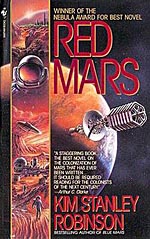
![]() Emil
Emil
9/5/2012
![]()
Mars has long since captured the imagination of SF writers, from The War of the Worlds, to Edgar Rice Burrough's fantastic adventures with John Carter and co, to even PKD idiosyncratic visions of a desert Mars in The Martian Time-Slip. Not many, however, give credence to the science that might be involved in manned missions to the planet, and the subsequent colonisation efforts. Red Mars, Green Mars and Blue Mars is by far the finest attempt in SF to imagine how the colonisation of Mars could progress.
The trilogy begins sometime in 2026 with the arrival of the First Hundred colonists, and the extensive and thoroughly detailed narrative follows the gradual progress of Martian settlement as it grows from a tiny outpoust of Earth to a fully self-contained world. The books are full of shifting alliances and disagreements, vividly imagined political growth and scientific debate between those who wish to progress with terraforming Mars and those who advocate a more moderate and cautious approach to meddling with the planet's natural environment. More tensions arise when more colonists arrives, and the precarious relationship of Mars with Earth, and later between Mars and other planets and settlements in the solar system, are strained to the point of revolutions.
Where some may criticize the extensive detail of Robinson's narrative that may offtimes boarder on pococurantism, his imagination is clearly stirred by the potential of manned travel to Mars, and expansion into the solar system as a whole, logically resulting in breathtaking world-building, lavish descriptions of the Martian landscape and copious attention to detail, which are arguably the best SF (and fantasy) can offer. He wants the books to be as scientifically accurate as it can be and there is most certainly much more to the books that mere scientific speculation. Mars is the main character, but Robinson also succeeds in crafting well-rounded and believable human characters caught up in unprecendented circumstances. Their relationships, poltical alliances, arguments, pioneering proclivity and the effect of Mars on them are brought sharply to life. The hard science of terraforming, the weird geology of another planet and the psychology of settling a new world are utterly convincing to the point that one may be forgiven for believing you are reading a true, historically accurate account of the formation of a new world and a new society, in similar vain to the writings of historian Howard Zinn. This, I came to believe, is truly what future colonisation of Mars will be like.
Highly, highly recommended as probably the finest example of hard SF, and certainly one of the best SF narratives of all time. A monumental achievement to be savoured and lived in.
Red Mars:
Scientific - Deals with colonisation attempts, genetic engineering
Political - First revolution against Transnet forces